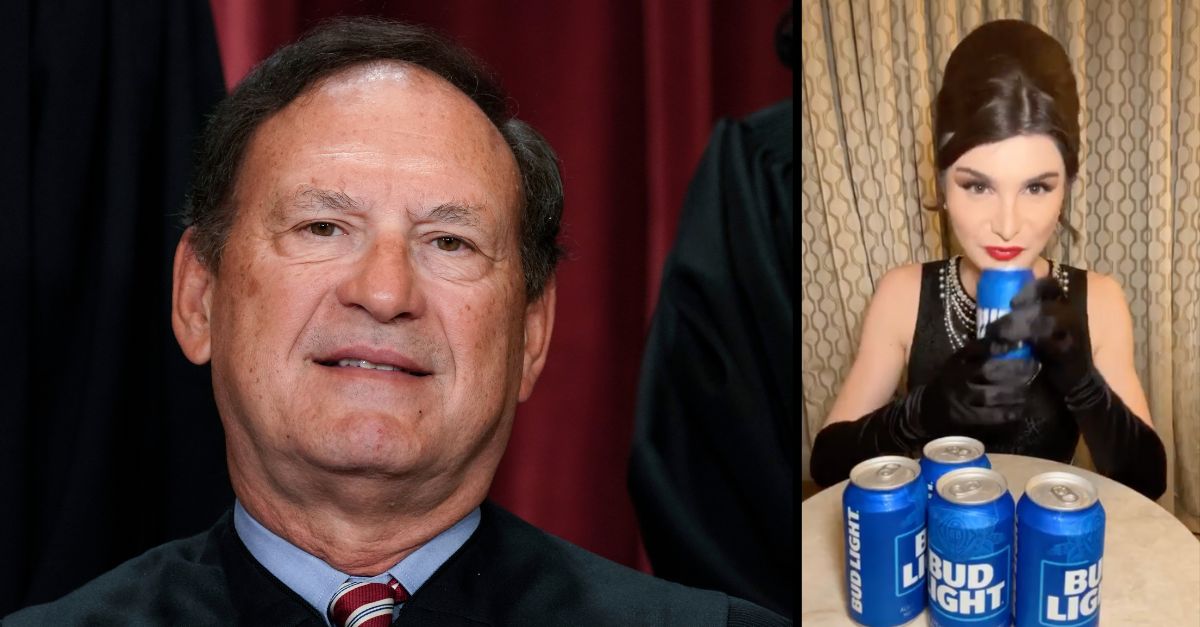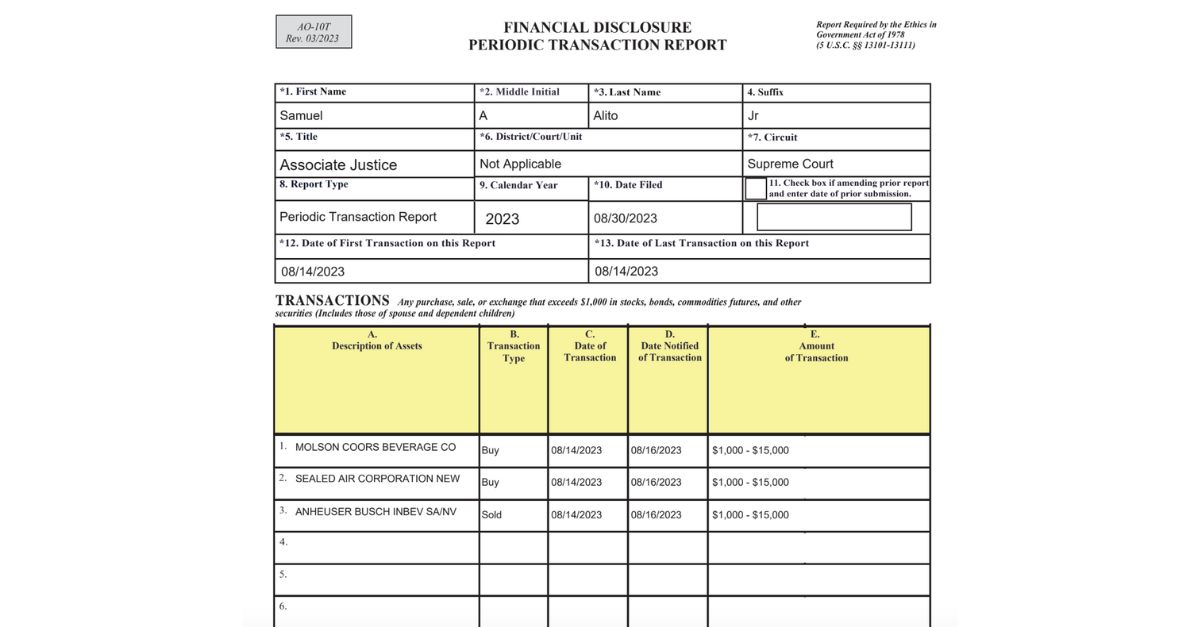
Left: U.S. Supreme Court Justice Samuel Alito (AP Photo/J. Scott Applewhite, File). Right: Dylan Mulvaney endorses Bud Light in an online video. (Screengrab via Instagram).
U.S. Supreme Court Justice Samuel Alito not only apparently flew an upside down flag in his window after the 2021 attack on the Capitol, but records reportedly show he sold his Bud Light stock amid a conservative firestorm resulting from a transgender influencer’s marketing campaign for the beer.
On April 1, 2023, 26-year-old Dylan Mulvaney, an activist and influencer who is transgender, promoted Bud Light beer on Instagram by posting a video to promote a contest. Mulvaney has 1.8 million followers on Instagram and 10.6 million on TikTok.
The post read as follows:
Happy March Madness!! Just found out this had to do with sports and not just saying it’s a crazy month! In celebration of this sports thing @budlight is giving you the chance to win $15,000! Share a video with #EasyCarryContest for a chance to win!! Good luck! #budlightpartner
Mulvaney had documented part of her gender transition online in a series known as “Days of Girlhood.” In Mulvaney’s video, she mentioned that Bud Light sent her a can with a picture of her face on it to celebrate her video series, and showed the can with the illustration.
Outrage from conservative forces in response to Mulvaney’s video was swift and fierce. Musician Kid Rock posted a video of himself shooting cases of Bud Light at a gun range in what he would later describe as a “tantrum with a machine gun,” and two of the company’s top executives took a leave of absence. Anheuser-Busch reported not long afterward that revenue in the United States was down by over 10 percent due to the decline of Bud Light.
The controversy reached a flashpoint when on Sunday, Aug. 13, 2023, far-right, anti-LGBTQ influencer Chaya Raichik of Libs of TikTok posted a photograph of Mulvaney prior to her transition, calling Mulvaney “a dude.”
The next day, on Monday, Aug. 14, 2023, Alito sold stock in Anheuser-Busch and bought stock in Molson Coors. The information detailing the transaction was listed in a periodic transaction report that was shared by legal blog Law Dork Monday, but which is currently unavailable in the Federal Judicial Financial Disclosure Reports database.
A screenshot of the report is shown below.

The justices are not specifically prohibited from participating in boycotts. However, the Code of Ethics onto which all nine justices signed on in November 2023 acknowledges justices’ responsibility to refrain from engaging in “political activity.”
The document’s definition reads as follows:
CANON 5: A JUSTICE SHOULD REFRAIN FROM POLITICAL ACTIVITY.
A Justice should not: (1) act as a leader or hold any office in a political organization; (2) make speeches for a political organization or candidate, or publicly endorse or oppose a candidate for public office; or (3) solicit funds for, pay an assessment to, or make a contribution to a political organization or candidate, or attend or purchase a ticket for a dinner or other event sponsored by a political organization or candidate. A Justice should resign the judicial office if he or she becomes a candidate in a primary or general election for any office. A Justice should not engage in other political activity.
Furthermore, the code said the justices must recuse themselves in cases to which they are personally connected and avoid engaging in activities that “detract from the dignity” of their official duties. The justices noted in their introductory statement that many of the ethics requirements were “not new.”
The code conspicuously omitted any reference to an enforcement mechanism.
News of Alito’s stock sale comes just days after the justice made headlines over an upside-down flag being flown at his residence shortly after the Jan. 6 insurrection at the U.S. Capitol. Alito denied any personal involvement with the flying of the flag, but said his wife made the choice in response to an ongoing dispute with neighbors.
Alito has been the subject of widespread criticism for both the flag display and his response to it. Advocacy groups have even called for Alito to recuse himself in cases related to Donald Trump or the insurrection.
Likewise, many are now calling for Alito to recuse in cases involving transgender rights. The justices are currently considering whether to take up appeals involving the Tennessee and Kentucky bans on gender-affirming care for minors to go into effect.
Alito famously dissented in a landmark decision over LGBT rights in which the justice called it “radical” to include anti-LGBT discrimination in Title VII’s prohibitions. In his dissent, Alito included an appendix of dictionary pages defining sex, and argued that when it comes to federal civil rights, “sex” must be defined in exactly the way that lawmakers understood that term in 1964, when the Civil Rights Act was drafted.
Have a tip we should know? [email protected]







